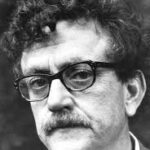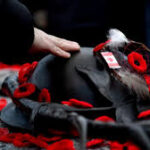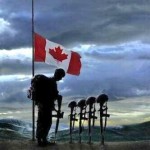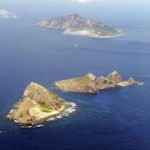If a remarkable speaker came to a school and nobody listened, did he actually say anything? (If a tree falls in the forest…) I do the odd suppy teaching gig, and I got thinking about an assembly held in a small-town high school of my intimate acquaintance.
It was the spring of ’02, I think. The principal had booked a speaker; not the usual “you-have-so-much-to-gain-from-getting-involved-so-hey-whaddaya-got-to-lose!” motivational banter from a caffeinated twenty-something with a degree and no job. This was a lecture on Canada’s place in the world from a greying Gwynne Dyer: historian, writer and commentator on international affairs. (I’m still not sure what he was doing in the Home of the Blue Devils.) The staff had been poorly briefed, and the students didn’t know what was up, but it was a substitute for fourth period, so we trooped down to the auditorium at two o’clock. At least, those of us who hadn’t already escaped to Timmy’s or McD’s.
I was superbly biased: I’d read Dyer in newspapers, seen him on The National, and been wowed by his eight-part documentary film, War. (It made me want to teach history.) He’s a brilliant guy, rumpled and wryly funny, so I was looking forward to hearing him speak. (Yes, I often feel alone. How’d you know?) He spoke for 50 minutes, with two major points to make. He put our present world situation in perspective, apologizing for the role he plays in the media’s portrait of the world as a frighteningly violent and despairing place. (I don’t think he would retract the grimly but clearly optimistic tone he took that day, but his recent book IS Future: Tense — The Coming World Order? His biggest concern there was America’s singular quest to police the world, including this typically blunt Dyer-ism: “The United States needs to lose the war in Iraq as soon as possible. Even more urgently, the whole world needs the United States to lose the war in Iraq.”)
But back then, the end of the Cold War had him arguing the following, in spite of the threat of terrorism: “The world is in better shape than it has been in my entire lifetime” and “World War III has been cancelled!” He argued that the generation of high schoolers he was facing had great reason to be hopeful about the world they were inheriting. Second, he argued that “the single best thing Canadians have done” was the 1967 reworking of the Immigration Act. It has steadily transformed Canada from an inward-looking population descended from northern European settlers, he said, into “a representative sample of the human race”, the most diverse country on earth. Sure, there are problems, he explained, but not only does this diversity make us truly interesting, but it gives us a creative advantage in the global marketplace, and is the key to diluting French-English antagonism and preserving Canadian unity. Whew! It was a big message for suburban white kids on a Thursday afternoon.
There were twin conclusions to the talk. One was Dyer’s: “It’s a great country—take good care of it!” The other, after an odd delay — so that our guest could leave the room, I guess — was our vice-principal’s dressing-down of the students for their rudeness and lack of attention. Which message are they going to remember? I wondered. I was moving past my own reaction (impressed) to Dyer to consider what the rest of the crowd got from it. I picked out one red-headed Brain that I’d worked with in class and cross-country running. “Hey, Chris, Canada’s in the world — who knew?” I said, and he smiled. He’d obviously been tuned in; he separated himself from those around him by his unbroken attention and by laughing at Dyer’s subtle jokes. (Mentioning the sexual revolution of the 60s, he had deadpanned, “Pity you missed it”). Chris’s buddy Ryan admitted (well, confessed, actually) that he had understood most of Dyer’s talk, noting a bit sheepishly that “we always listen to CBC Radio and my dad always talks to me about this stuff”. These guys felt a little alone, too.
Most of the students I talked to had more to say about the V.P.’s 30 seconds than about Mr. Dyer’s hour. Pressed to comment on his address, comments ranged (but not too widely) from “It was boring/stupid” to a disgusted “He just stood there and talked” to a more self-examining “I tried to pay attention but I couldn’t follow it, so of course we’re gonna talk a bit…” I was amazed. We hear all the time about kids and short attention spans and how information needs to be a jump-cutting jolt of entertainment to get through to them. I was facing them daily then, but I was still surprised by how many had surfed to another channel (if not another location altogether) before Dyer had finished his opening comments, or, in some cases, spoken at all. Perhaps I didn’t want to think about how little of my own chalk-stained raving had flown right past bland and pleasant faces…
Granted, we hadn’t been very well-prepared. Students who heard afterwards from a teacher that Mr. Dyer had been shot at several times in the course of his globe-trotting journalism, or spent time as a sailor, said “I wish they’d told me that before!” And we should have prepared the kids much better. It was an afternoon that made high school teaching feel, just fer a second there, like the ultimate tilt at a bored and impervious windmill. But thanks for coming out, Gwynne.
(Hey, my site seems to be working! A condensed version of this piece will appear shortly in my hometown weekly, The Grand River Sachem.)






